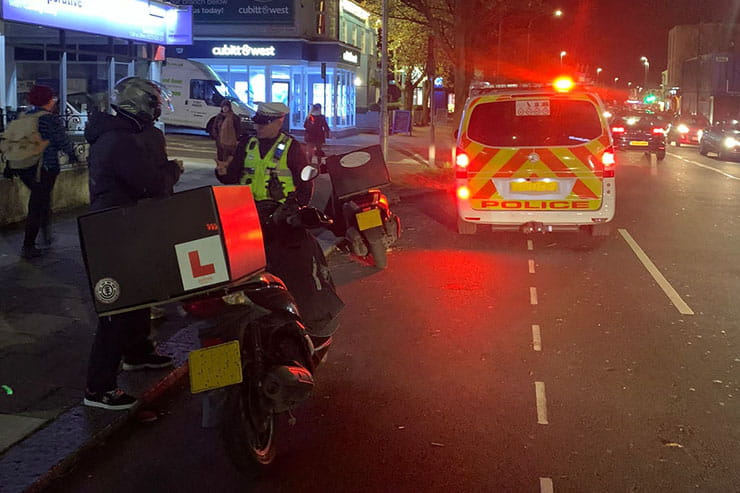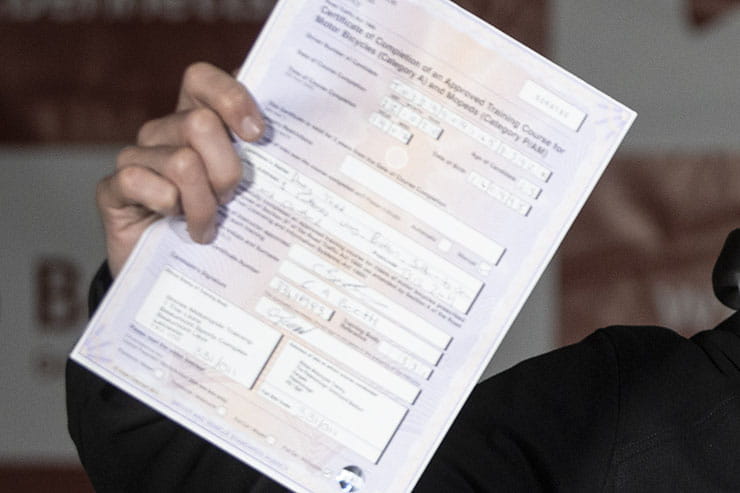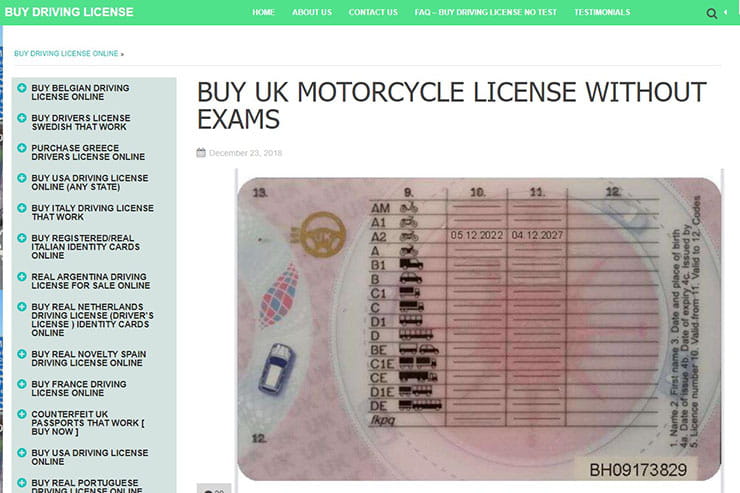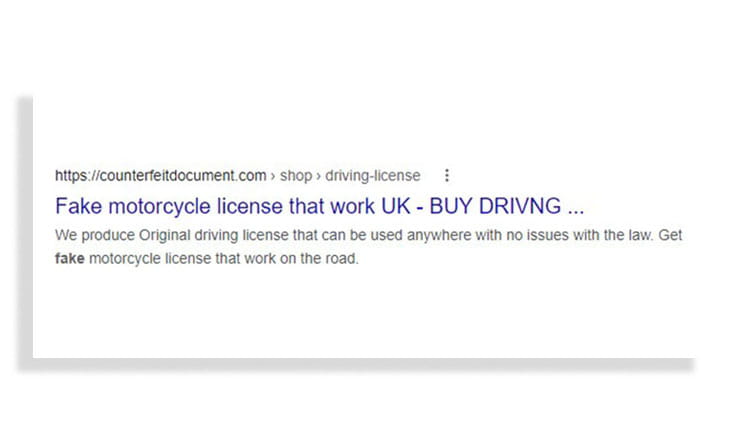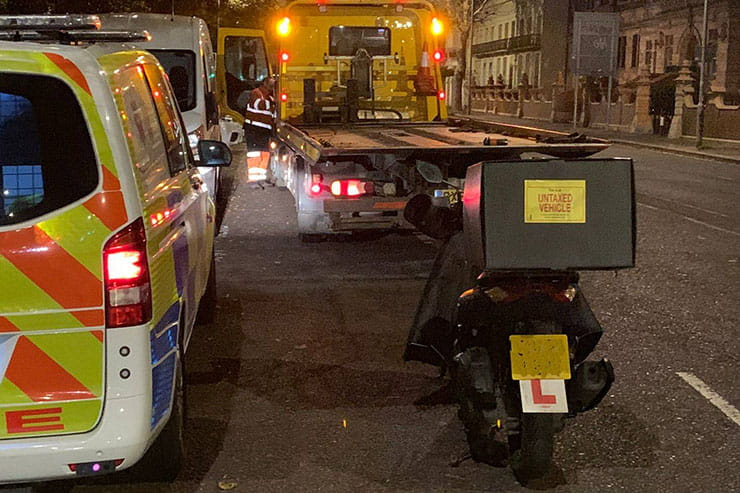Around 180,000 riders complete Compulsory Basic Training every year in the U.K. but BikeSocial has discovered some riders have been found trying to pass off fake Compulsory Basic Training Certificates (CBTs) to the authorities at roadside checks. To find out how big a problem it is and what the dangers are we took at look to see how widespread it is.
What is a CBT Certificate?
A new rider gets awarded a CBT certificate to confirm that they have passed the Compulsory Basic Training Course from an authorised training centre. Once they have applied for a provisional licence all new riders have to complete a CBT before they are allowed onto the road.
Once they’ve completed Compulsory Basic Training, the certificate is valid for two years during which time the rider must complete their motorcycle test otherwise the certificate runs out of time, and they must either stop riding or complete another CBT.
How much does a CBT cost?
CBT training generally costs between £100 to £150 depending on the training school but that is if a rider can complete the training successfully, if they need extra training then it could cost a bit more.
How long does it take to complete Compulsory Basic Training?
The DVSA (Driver and Vehicle Standards Agency) expects the overall duration of a CBT course to be at least a day in order to complete the training syllabus to a satisfactory standard and to comply with the legislation. They also state that It must be recognised some riders may take longer than a day to complete their training.
What’s the fake CBT scam?
A rider buys a fake CBT certificate online or makes one themselves in order to pass it off to the Police or Driver & Vehicle Standards Agency (DVSA) or possibly a perspective employer in the hope that they won’t check its validity, allowing the untrained rider to make a saving on paying for a CBT course. In reality, all the scammers will provide the rider with is a piece of paper that is worthless, regardless of how much they paid for it and when they get stopped by the police or DVSA they’ll get found out.
The flipside is the scammer will also want all the details of the person asking them to make a fake CBT for them, and who knows what they will do with those.
On another point, in a time of data security, we discovered social media users willingly showing photos of their legitimate CBT certificates to announce that they had completed the training at whatever training school and there were plenty of details included for potential scammers. Scammers could just as easily get hold of a legitimate CBT by official means and then copy those but there’s no point in making it easy for them.
Above: first page result on Google for the term ‘Fake CBT’, presumably a phishing site for data harvesting
How are the Police and DVSA combating the Fake CBT scam?
Chris Parr, the DVSA’s Rider Policy Manager, told BikeSocial, “DVSA is aware of companies offering fake CBT certificates on social media and is working with the police to assess the scale of this issue.
“We have a dedicated enforcement team using intelligence and road operations to clamp down on riders and others attempting to defraud the system.
“Riding without the proper training on any type of bike puts the rider and other road users at serious risk.”
Can the police and DVSA check whether a CBT is fake?
Yes, along with a good old fashioned visual check, technology has moved on and cops at the roadside have access to databases that show a riders’ ‘driver record’. The Police National Computer (PNC) holds records of when every stage of driver training is completed and will show the date that a rider has passed their CBT.
When a rider completes their CBT, the trainer will complete their certificate and hand it to them. The completed details are then uploaded to the DVSA’s database where they are sent onto the or Driver & Vehicle Licencing Agency (DVLA) for uploading onto the PNC. This might seem like there is a lag in the system where the DVLA are waiting for the details from the DVSA to upload onto the PNC. The DVLA told me that they receive notifications of completion of CBT courses from the DVSA periodically, in bulk. These are then updated as resources allow, with the DVLA stating that riders who have successfully completed the training should retain their certificate of completion.
As a result of a freedom of information request to the DVLA, we found that the number of notifications of completed CBTs waiting to go onto the Police National Computer as of the 5th January 2023 was 0. That’s right, the DVLA are up to date and all the available information is on the system for the police to check at the roadside.
As Chris Parr says above, the dedicated DVSA enforcement team are also working with the police on many roadside operations up and down the country where the DVSA team have access to their own database so can complete their own checks to see if a CBT certificate is valid even before it hits the DVLA database.
What are the dangers of not completing a CBT?
Riders who haven’t completed a course won’t have had their eyesight checked, it’s the first part of the CBT and they won’t have been shown how to use the controls of a motorcycle or even what they do. The CBT gives new riders a chance to practice off road in a safe environment under the guidance of a trainer who’ll point them in the right direction and give them tips on basic maintenance.
They’ll also get a classroom input on hazards before going on a road ride in radio contact with an instructor which last around two hours.
Without any training there comes an element of risk, the rider might not know how to appreciate hazards or ride appropriately for the conditions and ultimately if they get it wrong on a bike, they’ll injure themselves or others.
What’s the penalty for riding with a fake CBT certificate?
The DVSA have recovered a handful of fake CBT certificates and are currently working with the police to ascertain the full scale of the problem but if a rider is stopped at the roadside with one then at the very least, they will be riding otherwise in accordance with a driving licence. Holders of provisional motorcycle licence must have successfully completed compulsory basic training before they can ride on the road (without an instructor with them) and therefore hold a certificate of completion of a CBT. It’s the same offence that covers learner riders riding without L plates.
The offence of driving otherwise in accordance with a licence comes with 3-6 penalty points which will go on the rider’s provisional licence with a code of LC20. The endorsement code remains on the licence for 4 years from the date of the offence and comes with a £100 fixed penalty. If the rider opts to take the matter to court, then the fine could rise to a maximum £1000.
A rider’s bike could also be seized as the rider will be riding outside of the restrictions on their licence and the police can charge £150 for recovery and £10 per day storage.
Alternatively, and much more seriously, Sec 3 of the Forgery Act 1981 states that it is an offence for a person to use an instrument,(in this case it would be a fake CBT certificate) which is, and which he knows or believes to be, false, with the intention of inducing somebody to accept it as genuine, and by reason of so accepting it to do or not to do some act to his own or any other person’s prejudice.
A person being found guilty could go to prison for up to 10 years, which seems a big gamble in order to avoid a day’s training and at any rate the riders will still have to complete a CBT within two years or pay the scammers again.
It’s a better idea to cut out the scammers and just do the CBT in the first place.



